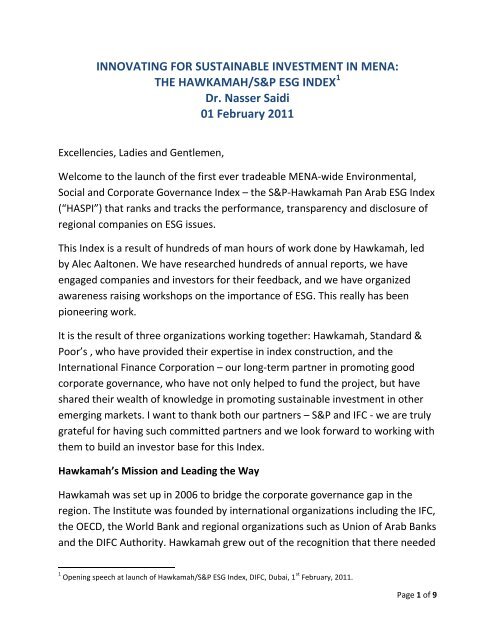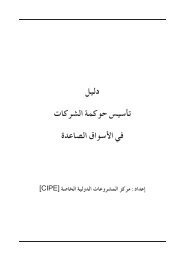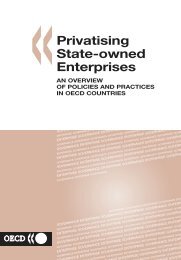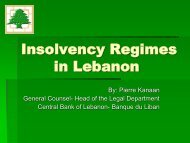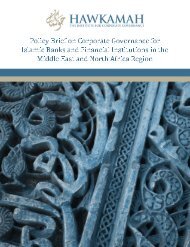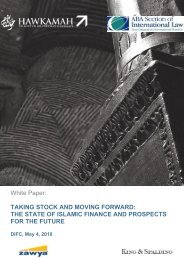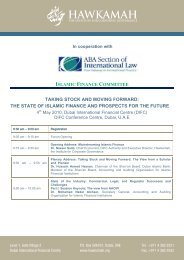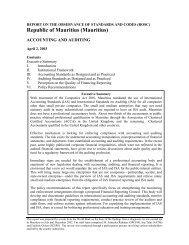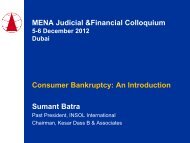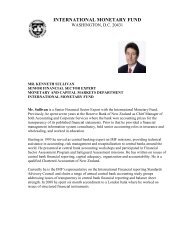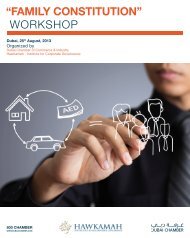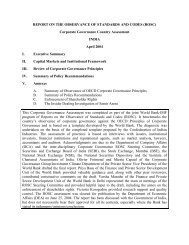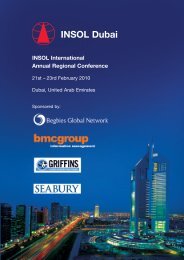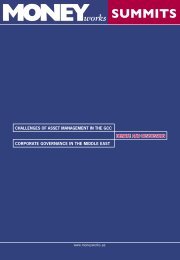Download PDF (310 KB) - Hawkamah, the Institute for Corporate ...
Download PDF (310 KB) - Hawkamah, the Institute for Corporate ...
Download PDF (310 KB) - Hawkamah, the Institute for Corporate ...
You also want an ePaper? Increase the reach of your titles
YUMPU automatically turns print PDFs into web optimized ePapers that Google loves.
INNOVATING FOR SUSTAINABLE INVESTMENT IN MENA:<br />
THE HAWKAMAH/S&P ESG INDEX 1<br />
Dr. Nasser Saidi<br />
01 February 2011<br />
Excellencies, Ladies and Gentlemen,<br />
Welcome to <strong>the</strong> launch of <strong>the</strong> first ever tradeable MENA-wide Environmental,<br />
Social and <strong>Corporate</strong> Governance Index – <strong>the</strong> S&P-<strong>Hawkamah</strong> Pan Arab ESG Index<br />
(“HASPI”) that ranks and tracks <strong>the</strong> per<strong>for</strong>mance, transparency and disclosure of<br />
regional companies on ESG issues.<br />
This Index is a result of hundreds of man hours of work done by <strong>Hawkamah</strong>, led<br />
by Alec Aaltonen. We have researched hundreds of annual reports, we have<br />
engaged companies and investors <strong>for</strong> <strong>the</strong>ir feedback, and we have organized<br />
awareness raising workshops on <strong>the</strong> importance of ESG. This really has been<br />
pioneering work.<br />
It is <strong>the</strong> result of three organizations working toge<strong>the</strong>r: <strong>Hawkamah</strong>, Standard &<br />
Poor’s , who have provided <strong>the</strong>ir expertise in index construction, and <strong>the</strong><br />
International Finance Corporation – our long-term partner in promoting good<br />
corporate governance, who have not only helped to fund <strong>the</strong> project, but have<br />
shared <strong>the</strong>ir wealth of knowledge in promoting sustainable investment in o<strong>the</strong>r<br />
emerging markets. I want to thank both our partners – S&P and IFC - we are truly<br />
grateful <strong>for</strong> having such committed partners and we look <strong>for</strong>ward to working with<br />
<strong>the</strong>m to build an investor base <strong>for</strong> this Index.<br />
<strong>Hawkamah</strong>’s Mission and Leading <strong>the</strong> Way<br />
<strong>Hawkamah</strong> was set up in 2006 to bridge <strong>the</strong> corporate governance gap in <strong>the</strong><br />
region. The <strong>Institute</strong> was founded by international organizations including <strong>the</strong> IFC,<br />
<strong>the</strong> OECD, <strong>the</strong> World Bank and regional organizations such as Union of Arab Banks<br />
and <strong>the</strong> DIFC Authority. <strong>Hawkamah</strong> grew out of <strong>the</strong> recognition that <strong>the</strong>re needed<br />
1 Opening speech at launch of <strong>Hawkamah</strong>/S&P ESG Index, DIFC, Dubai, 1 st February, 2011.<br />
Page 1 of 9
to be a regional organization working on <strong>the</strong> ground <strong>for</strong> corporate governance to<br />
achieve buy-in by stakeholders. Since <strong>the</strong>n we have been at <strong>the</strong> <strong>for</strong>efront of <strong>the</strong><br />
corporate governance debate in <strong>the</strong> region.<br />
Much of our work has been about putting corporate governance in <strong>the</strong> agendas of<br />
policy makers. We do not just talk about <strong>the</strong> importance of good corporate<br />
governance in abstract terms, but provide <strong>the</strong> region’s companies and regulators<br />
with practical tools on how to improve corporate governance in <strong>the</strong> region. We<br />
have done this with <strong>the</strong> banking sector, insurance industry and insolvency<br />
regimes, <strong>for</strong> example. We will be issuing a Policy Brief on corporate governance<br />
<strong>for</strong> Islamic Financial Institutions and Guidelines <strong>for</strong> <strong>the</strong> Private Equity industry in<br />
<strong>the</strong> coming weeks. <strong>Hawkamah</strong> is a ‘think and do’ tank!<br />
In <strong>the</strong> early days, we became accustomed to hearing two things: 1) <strong>the</strong> region<br />
needs good corporate governance 2) but that <strong>the</strong> region is not ready <strong>for</strong> re<strong>for</strong>m.<br />
But by engaging government & industry in our work, by conducting surveys and<br />
studies, we have created regional benchmarks which have acted as catalysts <strong>for</strong><br />
re<strong>for</strong>m.<br />
<strong>Hawkamah</strong>’s research indicates that <strong>the</strong>re have been significant improvements in<br />
corporate governance in <strong>the</strong> region in just a few short years. Although we still<br />
have issues with implementation, <strong>the</strong> concept & principles of corporate<br />
governance are now well accepted across <strong>the</strong> region. Regulators and companies<br />
have taken substantial steps, albeit from a low base, to improve <strong>the</strong>ir practices.<br />
Just looking at <strong>the</strong> GCC, in <strong>the</strong> past two years, corporate governance codes <strong>for</strong><br />
listed companies have been issued in Qatar, <strong>the</strong> UAE and Bahrain. Last year both<br />
<strong>the</strong> Saudi and Omani Capital Market Authorities set up corporate governance<br />
units to ensure proper implementation and compliance with <strong>the</strong>ir governance<br />
codes. We also welcome Kuwait’s ef<strong>for</strong>ts in establishing a Capital Market<br />
Authority, promising a new era of governance <strong>for</strong> Kuwaiti markets.<br />
As with our previous initiatives to bridge <strong>the</strong> corporate governance gap in <strong>the</strong><br />
region, HASPI is both ambitious and groundbreaking. Firstly, environmental and<br />
social factors are linked with corporate governance factors. For <strong>the</strong> first time in<br />
Page 2 of 9
<strong>the</strong> region, <strong>the</strong>se factors have been extensively quantified and translated into a<br />
series of scores measuring <strong>the</strong> reporting practices of MENA companies.<br />
The S&P-<strong>Hawkamah</strong> Pan Arab ESG Index includes <strong>the</strong> top 50 MENA companies<br />
based on <strong>the</strong>ir per<strong>for</strong>mance on nearly 200 ESG metrics, when compared to <strong>the</strong>ir<br />
regional peers. The constituents of <strong>the</strong> Index are drawn from a universe of <strong>the</strong><br />
150 largest and most liquid companies listed on <strong>the</strong> national stock exchanges of<br />
11 markets: Bahrain, Egypt, Jordan, Lebanon, Kuwait, Morocco, Oman, Qatar,<br />
Kingdom of Saudi Arabia, Tunisia and <strong>the</strong> United Arab Emirates. HASPI ranks<br />
MENA companies on nearly 200 ESG Issues Including carbon emissions, water and<br />
energy consumption, employee health and safety, community investment,<br />
charitable giving, financial reporting and auditing, Board independence and<br />
executive remuneration. Ms Alka Banerjee from S&P will cover <strong>the</strong> specifics of <strong>the</strong><br />
methodology in her presentation. The methodology has been proven through <strong>the</strong><br />
development of similar ESG indexes in Brazil, India and China.<br />
Responsible Investing<br />
The development of HASPI is a response to a number of regional and global<br />
developments. The first is <strong>the</strong> global financial crisis. It is now recognized that <strong>the</strong><br />
financial crisis was essentially a result of corporate governance failures and<br />
malpractices on multiple levels. Indeed, <strong>the</strong> recent 576-page report by <strong>the</strong> US<br />
government’s financial crisis inquiry commission, states that <strong>the</strong> 2008 financial<br />
meltdown was avoidable and largely caused by unnecessary risk-taking, corporate<br />
mismanagement and inept regulation.<br />
Most of <strong>the</strong> blame <strong>for</strong> <strong>the</strong> financial crisis can be placed on governance failures at<br />
<strong>the</strong> senior management level, on board level and on <strong>the</strong> regulatory level. But<br />
investors are waking up to <strong>the</strong> fact that firstly corporate governance concerns<br />
were not adequately incorporated into <strong>the</strong>ir investment decisions, and secondly<br />
that <strong>the</strong>y were not fulfilling <strong>the</strong>ir duties as share owners in pushing <strong>for</strong> corporate<br />
governance improvements in <strong>the</strong>ir investee companies.<br />
In <strong>the</strong> epicenters of <strong>the</strong> financial crisis – <strong>the</strong> US and UK, <strong>the</strong> emerging new<br />
corporate governance framework places much responsibility on <strong>the</strong> shoulders of<br />
Page 3 of 9
investors <strong>for</strong> monitoring <strong>the</strong> governance practices in <strong>the</strong> companies <strong>the</strong>y invest in.<br />
In <strong>the</strong> UK <strong>for</strong> example, <strong>the</strong> regulator has issued a Stewardship Code – a<br />
counterpart to <strong>the</strong>ir <strong>Corporate</strong> Governance Code that applies to shareholders,<br />
ra<strong>the</strong>r than companies. A similar Code is under development in South Africa and<br />
on <strong>the</strong> European level.<br />
I call <strong>for</strong> <strong>the</strong> GCC countries, who are capital exporting countries and major global<br />
investors, to develop similar guidelines. We must change investment policies to<br />
become active -if not activist- share owners and not passive shareholders!<br />
Investors are also recognizing <strong>the</strong> importance of incorporating environmental and<br />
social criteria corporate governance criteria in <strong>the</strong>ir investment decision-making<br />
processes. For today’s long-term investors, i.e., <strong>the</strong> SWFs, Islamic financial<br />
industry, pension funds, <strong>the</strong> providers of patient capital, investment risk is linked<br />
not only to whe<strong>the</strong>r a company is well-governed with strong internal controls and<br />
auditing processes, but also to whe<strong>the</strong>r it manages relationships with its<br />
employees, customers and <strong>the</strong> communities in which it operates, and has a strong<br />
regard <strong>for</strong> <strong>the</strong> environmental impact of its business.<br />
It is now generally accepted that ESG issues can have medium & long-term<br />
consequences <strong>for</strong> a company’s financial per<strong>for</strong>mance. The recent BP Gulf of<br />
Mexico oil spill, which halved <strong>the</strong> company’s share price in a couple of weeks, is a<br />
prime illustration of <strong>the</strong> risks of neglecting ESG. To put it simply, incorporating<br />
ESG in <strong>the</strong> investment decision process is good <strong>for</strong> <strong>the</strong> bottom line.<br />
This thinking or what has become known as responsible investment or sustainable<br />
investment is becoming increasingly part of <strong>the</strong> mainstream in <strong>the</strong> global<br />
investment community. In <strong>the</strong> past four years, 800 institutions across <strong>the</strong> world<br />
have signed up to <strong>the</strong> United Nations Principles <strong>for</strong> Responsible Investment.<br />
These signatories represent around USD 22 trillion of assets, which is more than<br />
10% of total global capital markets. This trend is set to continue. The Responsible<br />
Page 4 of 9
Investment market is <strong>for</strong>ecast to grow to account <strong>for</strong> 15-20% of <strong>the</strong> total global<br />
market by 2015. 2<br />
Tapping into <strong>the</strong> SRI investments/ Tool <strong>for</strong> international institutional investors<br />
We are currently witnessing a significant global flow of capital from <strong>the</strong><br />
developed markets to <strong>the</strong> emerging markets driven by <strong>the</strong> quest <strong>for</strong> higher<br />
returns and <strong>the</strong> pumping of liquidity by <strong>the</strong> Fed and o<strong>the</strong>r central banks. But our<br />
region is overlooked by global investors. The MENA region tends to be better at<br />
exporting capital than retaining and importing capital. But attracting international<br />
institutional investors is particularly important <strong>for</strong> <strong>the</strong> region in that ‘patient<br />
capital’ tends to dampen market volatility and deepens <strong>the</strong> sophistication of<br />
markets with more efficiently priced stocks.<br />
Market perceptions and expectations of returns and risks determine where global<br />
capital will flow, and, ceteris paribus, it will flow to where it is best protected.<br />
Global capital flows will generally avoid markets where investor protection is<br />
perceived as weak or uncertain – and this is <strong>the</strong> general perception of <strong>the</strong> MENA<br />
markets.<br />
Although ESG reporting among <strong>the</strong> regional companies on <strong>the</strong> whole is weak<br />
when compared to o<strong>the</strong>r emerging markets, <strong>the</strong> companies included in <strong>the</strong> HASPI<br />
stand out as <strong>the</strong> better per<strong>for</strong>ming companies. In o<strong>the</strong>r words, <strong>the</strong> ESG Index is a<br />
useful tool <strong>for</strong> institutional investors in identifying MENA companies with strong<br />
ESG practices.<br />
Of course, a company’s inclusion in HASPI is not a guarantee that fraud,<br />
governance scandals or environmental disasters will not happen. But it provides<br />
an extra layer of assurance. In <strong>the</strong>se turbulent times, fund managers need that<br />
extra layer of assurance. And <strong>the</strong>n <strong>the</strong>re is <strong>the</strong> human dynamic - a fund manager<br />
will face many awkward questions from investors if he or she decides to invest in<br />
2 See Booz & Co.<br />
http://investmentadvisor.com/Issues/2009/September%202009/PublishingImages/Whitepaper_ResponsibleInvest<br />
ing.pdf<br />
Page 5 of 9
a company that is not part of <strong>the</strong> Index, which <strong>the</strong>n experiences an ESG-related<br />
incident! Neglect ESG at your own peril!<br />
International institutional investors tend to be wary of <strong>the</strong> MENA region because<br />
of our poor track record in transparency, ESG disclosure and reporting. The<br />
<strong>Hawkamah</strong>/S&P Index addresses <strong>the</strong> elephant in <strong>the</strong> room, and identifies <strong>the</strong><br />
companies that go <strong>the</strong> extra mile in ESG reporting. The reporting has a “signaling<br />
effect”, acting as a proxy <strong>for</strong> good management. The potential is large: <strong>the</strong> IFC<br />
estimates that MENA assets under management related to sustainability are in<br />
excess of $54 billion, greater than in India or China.<br />
SRI and Regional Investors<br />
Socially responsible investing is yet to take off among <strong>the</strong> region’s institutional<br />
investors. For example, <strong>the</strong>re are only two UNPRI signatories in <strong>the</strong> MENA,<br />
<strong>Hawkamah</strong> being <strong>the</strong> first. Abraaj Capital, one of <strong>Hawkamah</strong>’s partners, remains<br />
<strong>the</strong> only investor in <strong>the</strong> region to sign up to <strong>the</strong> Principles. I urge all regional<br />
investors to adopt <strong>the</strong>se Principles and <strong>Hawkamah</strong> is more than happy to<br />
facilitate this process.<br />
The underdeveloped state of responsible investing is not particularly surprising,<br />
given that ESG is a relatively new concept in <strong>the</strong> region. Though investors in <strong>the</strong><br />
region do acknowledge <strong>the</strong> importance of ESG <strong>for</strong> sustainable and lower return<br />
volatility, ESG factors are not <strong>for</strong>mally integrated in <strong>the</strong> investment process. Part<br />
of this is due to unavailability of data and indicators, lack of know-how, lack of<br />
governance specialists within investment houses, and because it is a difficult task<br />
to assign a numerical figure to governance criteria.<br />
That is why <strong>the</strong> S&P/<strong>Hawkamah</strong> Index is particularly useful to <strong>the</strong> region’s<br />
investors. HASPI is based on <strong>the</strong> tried and tested methodology of two earlier<br />
indices – one in India and <strong>the</strong> o<strong>the</strong>r in Egypt- both of which have outper<strong>for</strong>med<br />
<strong>the</strong> market benchmark. HASPI, in o<strong>the</strong>r words, is a useful tool <strong>for</strong> <strong>the</strong> region’s<br />
investors as a way to incorporate ESG factors in <strong>the</strong>ir investment process.<br />
Page 6 of 9
The ESG Index and Listed Companies<br />
HASPI is not only a tool <strong>for</strong> investors, but also <strong>for</strong> companies. <strong>Hawkamah</strong> believes<br />
in providing incentives <strong>for</strong> per<strong>for</strong>mance. Inclusion in <strong>the</strong> Index provides public<br />
recognition <strong>for</strong> <strong>the</strong> region’s companies of <strong>the</strong>ir ESG practices. But <strong>the</strong> Index is<br />
more than just a badge of honor. As <strong>the</strong> SRI movement spreads among <strong>the</strong><br />
investment community, capital will start flowing towards companies with better<br />
ESG reporting, <strong>the</strong>reby improving <strong>the</strong>ir access to external capital.<br />
It also sets <strong>the</strong> benchmark <strong>for</strong> companies <strong>for</strong> <strong>the</strong> type of ESG or sustainability<br />
reporting expected by long-term investors. I encourage <strong>the</strong> region’s stock<br />
exchanges and regulators to pay heed to this new benchmark and mandate<br />
improved sustainability reporting by <strong>the</strong> companies <strong>the</strong>y are listing & supervising.<br />
ESG reporting should be part of listing criteria.<br />
The Ultimate Beneficiaries<br />
So far I have mentioned a number of reasons why <strong>Hawkamah</strong> started <strong>the</strong><br />
development of this Index with our partners - I have highlighted <strong>the</strong> link between<br />
ESG and long-term per<strong>for</strong>mance, how ESG is good <strong>for</strong> <strong>the</strong> bottom line, how <strong>the</strong><br />
Index will potentially help attract long-term international institutional investors to<br />
<strong>the</strong> MENA, which in turn will help deepen our markets and make <strong>the</strong>m more<br />
efficient. But <strong>the</strong> ultimate beneficiaries of our companies practicing better ESG<br />
and of our investors adopting ESG criteria are all of us, including future<br />
generations.<br />
The MENA region is also particularly vulnerable to climate change. We live in<br />
some of <strong>the</strong> most fragile ecologies on earth. We are one of <strong>the</strong> most vulnerable<br />
regions to warming, reduced precipitation and rise in sea levels. Water supply<br />
sources in <strong>the</strong> Arab world, two-thirds of which originate outside <strong>the</strong> region, are<br />
being stretched to <strong>the</strong>ir limits. The level of water scarcity is <strong>the</strong> highest in <strong>the</strong><br />
world and is rapidly growing, threatening to lead to confrontation, to ‘water<br />
wars’.<br />
A recent report by <strong>the</strong> Arab Forum <strong>for</strong> Environment and Development stated that<br />
<strong>the</strong> Arab world will be facing severe water shortages as early as 2015, as <strong>the</strong><br />
Page 7 of 9
annual per capita share will be less than 500 cubic meters. This is less than 10% of<br />
<strong>the</strong> world’s average. The same report warned that without fundamental changes<br />
in policies and practices, <strong>the</strong> situation will get worse, with drastic social, political<br />
and economic ramifications.<br />
Global models predict sea levels rising from about 0.1 to 0.3 meters by <strong>the</strong> year<br />
2050 and from about 0.1 to 0.9 meters by 2100. For MENA, <strong>the</strong> social, economic,<br />
and ecological impacts are expected to be relatively higher compared to <strong>the</strong> rest<br />
of <strong>the</strong> world. Low-lying coastal areas in Tunisia, Lebanon, Qatar, Libya, UAE,<br />
Kuwait, and particularly Egypt are at particular risk.<br />
Adding to environmental stress & damage, <strong>the</strong> MENA region is becoming a<br />
significant contributor in terms of greenhouse emissions. Currently it represents<br />
about 6% of global greenhouse gas emissions, but we have <strong>the</strong> fastest rising<br />
regional per capita emissions in <strong>the</strong> world. The region’s emissions grew five times<br />
faster than <strong>the</strong> global average from 1990-2005.<br />
We can easily imagine <strong>the</strong> impact of an oil spill similar to <strong>the</strong> one in <strong>the</strong> Gulf of<br />
Mexico happening here. The damage would be an environmental and human life<br />
threatening calamity, an ecocide. The Gulf here is our livelihood. We must ensure<br />
that our governments and companies are doing <strong>the</strong>ir best to manage and<br />
minimize <strong>the</strong>ir environmental risks. For <strong>the</strong> sustainability, not only of our<br />
investments and companies, but of our region and way of life, <strong>for</strong> intergenerational<br />
equity – we need to start taking ESG seriously.<br />
We must do so by supporting initiatives such as HASPI, but o<strong>the</strong>r initiatives as well<br />
such as <strong>the</strong> work of <strong>the</strong> Clean Energy Business Council, which aims to stimulate<br />
investment in <strong>the</strong> development and deployment of <strong>the</strong> world’s best clean energy<br />
technologies in our region.<br />
As <strong>the</strong> World Bank reminds us, <strong>the</strong> economic costs of environmental degradation<br />
are high in our region, varying from 2.1 percent of gross domestic product (GDP)<br />
in Tunisia, to as high as 7.1 percent of GDP in Iran. “This high cost of<br />
Page 8 of 9
environmental degradation spills into public finances, household budgets, <strong>the</strong><br />
competitiveness of <strong>the</strong> economy, and inter-generational equity.” 3<br />
Conclusion<br />
For <strong>Hawkamah</strong>, <strong>the</strong> rationale <strong>for</strong> developing HASPI is to address investor concerns<br />
about ESG practices in <strong>the</strong> MENA companies and raise awareness among regional<br />
companies and market players of <strong>the</strong> need <strong>for</strong> better ESG practices to attract<br />
patient capital, as well as to address core environmental and societal challenges,<br />
in <strong>the</strong> light of international best practice and standards. In essence, HASPI should<br />
be viewed as a useful benchmark <strong>for</strong> corporate sector re<strong>for</strong>m in <strong>the</strong> region. It<br />
aligns both <strong>the</strong> incentives to build our markets and societies, with <strong>the</strong> need to<br />
modernize our corporations by providing market incentives to corporate actors<br />
and regulators.<br />
Beyond this launch, more work needs to be done. <strong>Hawkamah</strong> stands ready to<br />
work with <strong>the</strong> region’s regulators, its stock markets and companies to improve<br />
our ESG practices.<br />
Thank you <strong>for</strong> your time and support.<br />
3 See World Bank “Sector Brief - Environment in MENA" http://go.worldbank.org/CUS7GMVHM0<br />
Page 9 of 9


